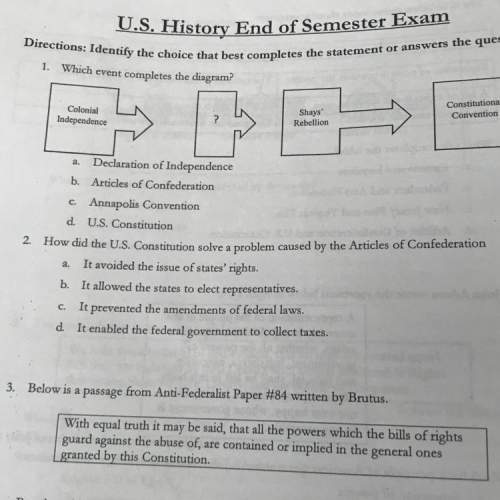
History, 27.11.2019 03:31 maddied2443
1. which economic problem did many latin american nations face in the years following world war ii?
lack of investment capital
overproduction of industrial goods
low agricultural output
small populations
2.which was an effect of industrialization in latin american nations during the postwar years?
more emphasis on farming
decreased global trade
the rise of caudillos
relocation of millions of workers to cities
3. which was not a reason for u. s. intervention in latin america during the cold war era?
civil war in el salvador
the fall of the soviet union
sandinista control of nicaragua
allende's rise in chile
4. which was not a result of u. s. intervention in latin america during the cold war era?
fighting continued against the guerillas in el salvador.
war between the contras and sandinistas in nicaragua intensified.
communism disappeared from latin america.
the military took control of chile.
5. which latin american nation was controlled by augusto pinochet?
cuba
argentina
nicaragua
chile
6. which describes the main purpose of the organization of american states (oas)?
encourage u. s. military involvement in latin america
create a single economy in latin america
provide a way to encourage regional cooperation in latin america
combat the influence of latin american drug lords
7. which best describes the rise to power of mao zedong?
with the backing of the united states, he overthrew a communist regime.
supported by wealthy chinese landowners, he led a popular revolution.
as the head of a nationalist army, he defeated traditional warlords. < --
leading an army of rural peasants, he launched a communist revolution.
8. which does not describe china's great leap forward?
a 15-year plan
a program designed to modernize the country
the elimination of confucianism
an attempt to increase industrial productivity
9. who was a key leader in india’s independence movement?
aung san suu kyi
jawaharlal nehru
ferdinand marcos
deng xiaoping

Answers: 1


Another question on History

History, 21.06.2019 15:10
What do states primarily use their reserved powers to regulate? a. services related to national citizenship b. issues that affect day-to-day life for state residents c. issues involving taxation d. issues that affect states' interaction with the federal government
Answers: 1

History, 21.06.2019 19:30
In the decision for dred scott vs.sanford, (1857) in which a slave petitioned for his freedom in a st. louis court, on the grounds that his owner had taken him into free territory, and thus he ought no longer be regarded as possessing "slave" status, but should be regarded as a free man, the court decided as follows (excerpt): "in the circuit courts of the united states, the record must show that the case is one in which by the constitution and laws of the united states, the court had jurisdiction--and if this does not appear, and the court gives judgment either for plaintiff or defendant, it is error, and the judgment must be reversed by this court--and the parties cannot by consent waive the objection to the jurisdiction of the circuit court. a free negro of the african race, whose ancestors were brought to this country and sold as slaves, is not a 'citizen' within the meaning of the constitution of the united states. when the constitution was adopted, they were not regarded in any of the states as members of the community which constituted the state, and were not numbered among its 'people or citizen.' consequently, the special rights and immunities guarantied to citizens do not apply to them. and not being "citizens" within the meaning of the constitution, they are not entitled to sue in that character in a court of the united states, and the circuit court has not jurisdiction in such a suit. the only two clauses in the constitution which point to this race, treat them as persons whom it was morally lawful to deal in as articles of property and to hold as slaves. since the adoption of the constitution of the united states, no state can by any subsequent law make a foreigner or any other description of persons citizens of the united states, nor entitle them to the rights and privileges secured to citizens by that instrument." why does the court say that the petitioning party in this case had no right to sue for his freedom? a) because he is too young b) because he is from a different state c) because he is "of the african race" with enslaved ancestors d) because he is, properly speaking, within his owner's jurisdiction
Answers: 1

History, 21.06.2019 21:10
How did the northern u.s. change during the 19th century? select the best choice from the answers provided. a. it became more industrial. b. it became more agrarian. c. it became less populated. d. it became less diverse
Answers: 2

History, 21.06.2019 21:30
Which of the following statements described the sons of liberty
Answers: 1
You know the right answer?
1. which economic problem did many latin american nations face in the years following world war ii?...
Questions

Mathematics, 15.12.2020 01:00



Computers and Technology, 15.12.2020 01:00



History, 15.12.2020 01:00


Mathematics, 15.12.2020 01:00

English, 15.12.2020 01:00


Chemistry, 15.12.2020 01:00

History, 15.12.2020 01:00

Mathematics, 15.12.2020 01:00


Mathematics, 15.12.2020 01:00


Mathematics, 15.12.2020 01:00

Mathematics, 15.12.2020 01:00





